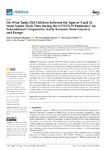On What Tasks Did Children between the Ages of 3 and 12 Years Spend their Time during the COVID-19 Pandemic? An International Comparative Study between Ibero-America and Europe

Use este enlace para citar
http://hdl.handle.net/2183/31164
A non ser que se indique outra cousa, a licenza do ítem descríbese como Atribución 4.0 Internacional
Coleccións
- Investigación (FEDU) [938]
Metadatos
Mostrar o rexistro completo do ítemTítulo
On What Tasks Did Children between the Ages of 3 and 12 Years Spend their Time during the COVID-19 Pandemic? An International Comparative Study between Ibero-America and EuropeAutor(es)
Data
2022Cita bibliográfica
Sanmiguel-Rodríguez, A.; Zagalaz-Sánchez,M.L.; Arufe-Giráldez, V.; Cachón-Zagalaz, J.; González-Valero, G. On What Tasks Did Children between the Ages of 3 and 12 Years Spend Their Time during the COVID-19 Pandemic? An International Comparative Study between Ibero-America and Europe. Children 2022, 9, 971. https:// doi.org/10.3390/children9070971
Resumo
[Abstract] The pandemic caused by COVID-19 meant, in many countries, the establishment of a period of confinement in which families were forced to restrict movement and social contacts with the consequent risk of inactivity. Our objective as to analyze the degree of psychosocial well-being, sociodemographic aspects and use of technological means depending on the educational level of the parents. The sample consisted of 2316 children aged between 3 and 12 years (M = 7.70; SD = 2.86). For the analysis and treatment of the data, the statistical software SPSS 25.0 (IBM Corp, Armonk, NY, USA) was used. We found that the European participants used more video consoles (M = 0.89 ± 1.33) and tablets (M = 1.30 ± 0.95), while the Ibero-Americans obtained higher values in the use of TV (M = 2.28 ± 1.10) and levels higher in a negative state of psychosocial well-being (M = 7.29 ± 1.07) and in tiredness/fatigue (M = 4.34 ± 2.44). We concluded that, during the period of confinement in European areas, higher values were obtained in the time dedicated to Physical Activity (PA), use of tablets, school task performance, artistic activities, family games, reading, free play and hours of sleep; while in Ibero-America, there were longer times in the use of technological devices and performing domestic tasks.
Palabras chave
Psychosocial well-being
Sociodemographic factors
Physical activity
Educational level of the parents
COVID-19
Sociodemographic factors
Physical activity
Educational level of the parents
COVID-19
Descrición
This article belongs to the Special Issue The Impact of COVID-19 in Children
Versión do editor
Dereitos
Atribución 4.0 Internacional






